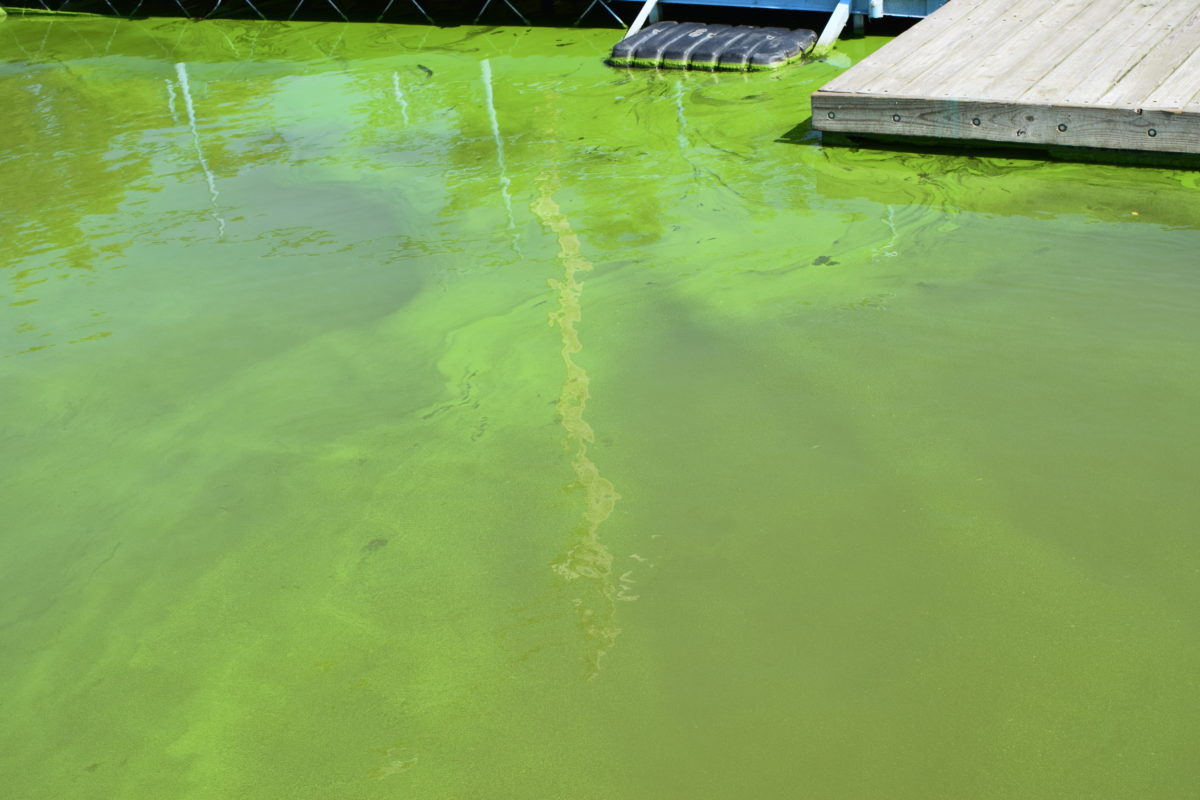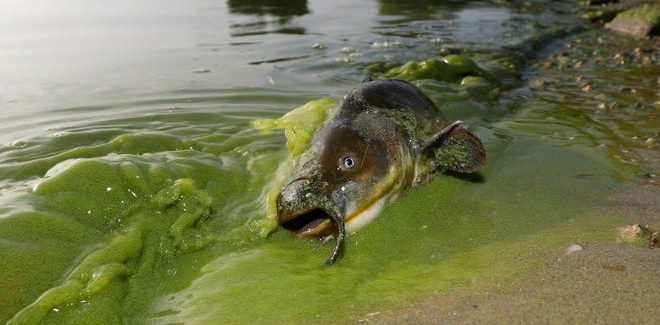Pro Se Statement to Ohio Sixth District Court of Appeals on behalf of Lake Erie Bill of Rights Case L-20-1041
Editor’s Note: Read the prepared remarks in defense of a pro se lawsuit to enforce the Lake Erie Bill of Rights. A version of the statement was presented in court on August 5, 2020 by Toledo resident, Mike Ferner, on behalf of Lake Erie and the Toledoans who passed the law. The lawsuit originates from a clause within LEBOR, which allows residents to file suit to enforce rights of the Lake Erie ecosystem, and residents. It advances and experiments with one avenue for participatory Rights of Nature enforcement.
Good morning your honors.
I’d like to acknowledge for the record that we are here today because of the thousands of hours volunteers spent petitioning through extremes of weather to put Lake Erie Bill of Rights or LEBOR on the ballot…vote passed 60-40%. These are major accomplishments Toledoans can be very proud of.
I have two brief remarks on justiciability and standing – both of which are in the briefs — I’ll be glad to address them, but the main part of my presentation deals with a remarkable confluence of Toledo history that bears directly on this case. I’ve written that part so I don’t miss any highlights and would like to deliver it now if I may.
The initiative that created LEBOR is just one of many ways citizens have tried to come to the aid of Lake Erie.
We have sent many hundreds of letters and postcards and made hundreds of phone calls to public officials trying to get them to do their jobs. We have leafleted and picketed, testified at hearings and attended scores of meetings. For three years now we’ve been in federal court trying to get the EPA to enforce the Clean Water Act.
Regardless of the State’s claims, the harms to Lake Erie we address are not speculative.
They are real.

We have tried to work within the system and found it painfully clear that the system works to protect the polluters. And while the state makes promises and spends millions of our tax dollars on more studies… and spends more millions on agricultural practices that haven’t worked… and the City pours more chemicals into our drinking water…the harm continues.
As the following examples show, closing the courts to people and the lake is just the latest injustice.
In Ohio’s 2019 biennial budget bill, a provision was inserted literally at the 11th hour, at the direct request of an Ohio Chamber of Commerce lobbyist, to prohibit any municipality from passing a law like the Lake Erie Bill of Rights.
Also that year, a provision was added to the Ohio Revised Code (sec. 929-04), that eliminated what limited right citizens had to file a nuisance suit against agricultural corporations known as CAFOs, or as we call them, animal feeding factories.
In the big picture, they annually dump twice as much untreated urine and feces on fields draining into western Lake Erie as generated by Los Angeles and Chicago combined. Just since Toledo’s water emergency in 2014, Ohio has licensed additional facilities generating an amount of waste equal to the population of SIX Toledos! And none of it goes through a sewage treatment plant.
Previously these corporations were protected if located in an agricultural district, which makes sense. Now, however, they’re also protected if conducted “in accordance with generally accepted agricultural practices,” which in plain English means animal feeding factories can be a legal nuisance as long as they operate like a generally accepted nuisance.

Photo copyright Dave Zapotosky
The word “corporation” isn’t found once in our Federal Constitution, even though it was a familiar concept since most of the colonies were crown corporations. Corporations had to be interpreted into or “found” in the Constitution by judges and since then, these legal fictions have accumulated more rights than real humans and more rights than Lake Erie which literally gives our city life.
Corporate constitutional rights were invented by Supreme Court rulings. And the resulting Frankenstein monster is now more legally powerful than people and certainly more powerful than nature – even though it is no more than a piece of paper issued by a secretary of state.
But today, in Toledo, we have a historically unique opportunity.
The Chief Justice of the court that first gave constitutional rights to a corporation was none other than Toledo’s own Morrison R. Waite, a railroad attorney. Indeed, a majority on that court were either railroad attorneys or directors.
You probably know that decision giving corporations the rights of human beings was the highly controversial, 14th amendment case of Santa Clara v Southern Pacific Railroad in 1886, reconfirmed three years later in Minneapolis & St. Louis Railroad v. Beckwith.
It is true there is no precedent in US law supporting the rights of nature, but as Ruth Bader Ginsburg said when arguing before the Supreme Court for the unprecedented right of gender equality, “we are asking you to protect the right of the country to change.” We ask you to help redefine what is of value. We ask you to have the courage to be the first, just like the people of Toledo were.
Before those decisions, the Court repeatedly turned down corporate attempts to usurp constitutional rights meant for natural persons. From the beginnings of the federal government in 1789 until 1886, judicial precedent was clear: corporations were purposely created subservient to people and the states that chartered them, with no rights whatever, beyond what legislators specifically granted.
Until those controversial Waite Court decisions, the greatly restricted life of a corporation began in a state legislature and could end when its charter came up for renewal or, as happened with some regularity, when a judge revoked a charter for corporate malfeasance and reassigned company assets as they would in a bankruptcy.
Here today, in Toledo, an almost cosmic providence must be at work, when you consider that after 134 years of growing corporate hegemony, begun under Chief Justice Waite, Toledo judges can now say, “Here, in our jurisdiction, Lake Erie will have as much right to exist and thrive as does a corporation.” Consider that for just a moment. It is challenging but it is also a spectacular opportunity, created by citizens who gathered all those signatures and a testament to Toledo voters who passed it.
You have that opportunity before you today. Isn’t it time to take this step, not only toward greater justice, but to insure our own survival? Everywhere we look today we can see that environmental realities outweigh legalities.
When we look back to the early days of our republic, we wonder how our ancestors could define slaves and women not as citizens or even people, but merely as property. A century from now, if our species survives, people will undoubtedly wonder how we could possibly have defined Lake Erie, a necessity for survival, as mere property to be exploited instead of a living and life-giving body with an inherent right to be healthy. And think how celebrated will be the people of Toledo and the court that stood behind them, who chose to turn that around?
We need brave judges to understand this, to correct the wrongs of the past; to make decisions that will cherish life and rescue our planet; to turn away from the depleted and deadly precedents that have brought life on Earth to the brink. Perhaps other judges couldn’t see or were too timid. But you cannot dispute that continuing the current course will only seal the fate of Lake Erie and all of us who depend on her.
And finally, we want to assure you that as we ask you to create new precedent, that ground has already been broken elsewhere.
In 2008, Ecuador rewrote its constitution adding rights of nature provisions, as did Bolivia in 2010. India and New Zealand have recognized the rights of nature in some cases. In 2019, the Bangladesh Supreme Court recognized the legal rights of rivers. That same year, Colombia recognized the rights of the Plata River. In the U.S., native tribes and small towns have conferred legal rights to parts of the environment in their jurisdictions.
When any movement bends the arc of history towards justice, it happens because the people who care do everything they can do. We are asking you to use what power you have, to continue the movement for the rights of nature begun by the people of Toledo. Join us in the global movement to recognize that nature, here starting with Lake Erie, has the right to thrive and flourish and let the people who rely on her act as her guardians.
It is true there is no precedent in US law supporting the rights of nature, but as Ruth Bader Ginsburg said when arguing before the Supreme Court for the unprecedented right of gender equality, “we are asking you to protect the right of the country to change.” We ask you to help redefine what is of value. We ask you to have the courage to be the first, just like the people of Toledo were.
-
(63 Ohio St.3d 146, 148049, 586 N.E.2d 80 (1992))

